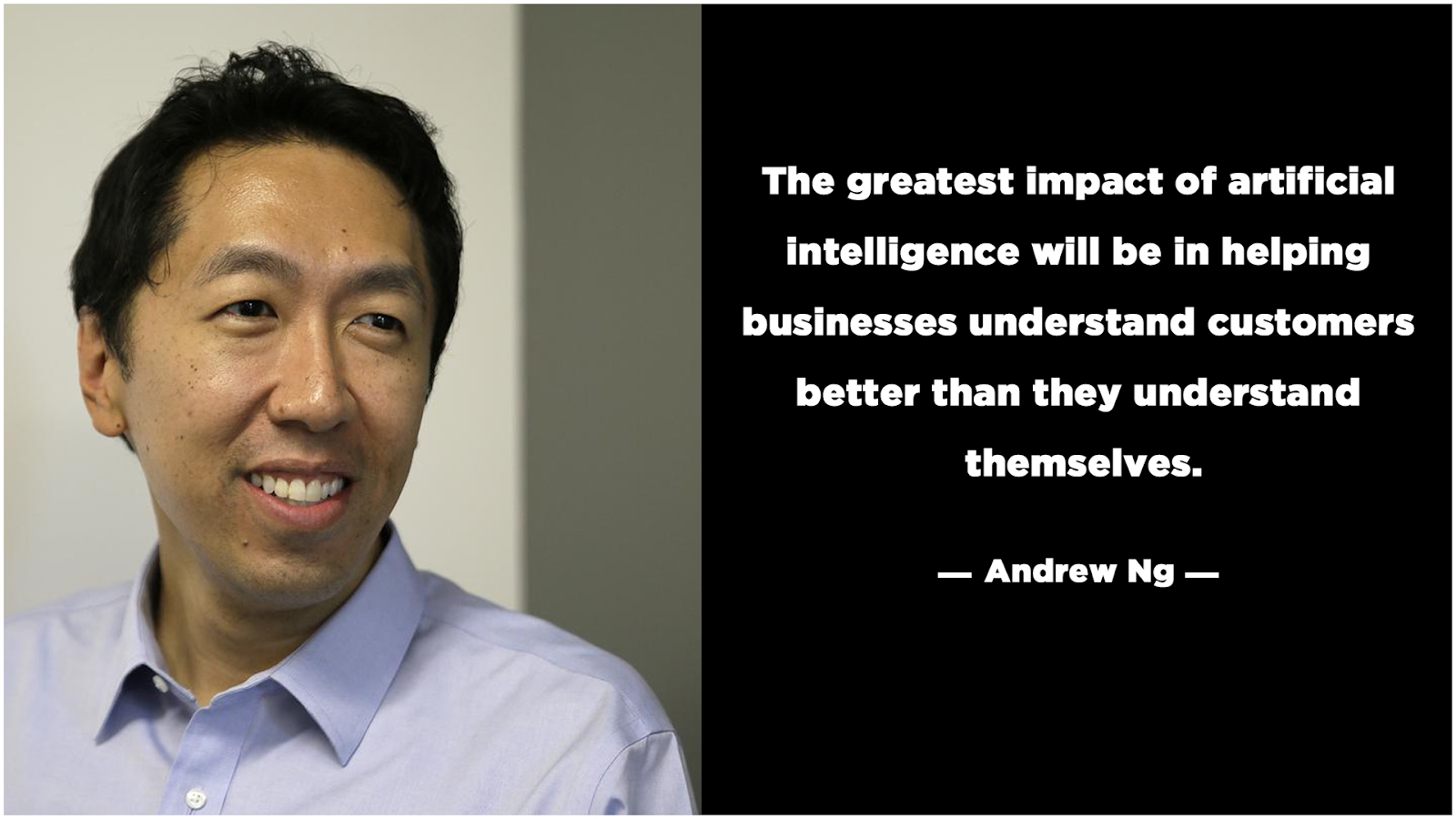Table of Contents
Introduction
In the fast-paced world of e-commerce, staying ahead of the curve is no longer optional—it’s essential. As consumer expectations evolve and competition intensifies, businesses are turning to artificial intelligence to gain a strategic edge.
From personalized shopping experiences and intelligent product recommendations to automated customer service and data-driven decision-making, AI-powered tools are reshaping the way e-commerce operates.
In this article, we’ll explore how these innovations are not only streamlining operations but also creating new opportunities for growth, efficiency, and customer satisfaction.
What Is Artificial Intelligence?
Artificial Intelligence (AI) is a type of technology that enables machines to learn from data and make decisions without being explicitly programmed.
- AI has become a critical component in the eCommerce landscape.
- It helps automate processes, saving time and reducing errors.
- AI provides valuable insights into customer behavior, enabling data-driven decision-making.
- AI-driven marketing tools assist businesses in identifying potential customers.
- These tools help develop personalized marketing campaigns based on user behavior and preferences.
- AI can optimize ad spending by targeting the right audience at the right time.
- It enables accurate measurement and analysis of campaign performance.
- Businesses can increase profits by streamlining operations and reducing costs associated with manual labor.
- AI enhances the overall customer experience by delivering personalized, timely, and relevant interactions.
- It allows companies to be more efficient while building stronger customer relationships.
Why You Should Use AI in eCommerce
AI is becoming increasingly prevalent in various aspects of modern life. The same holds true for e-commerce; AI has the potential to revolutionize the way businesses are run and how customers are served. By leveraging AI marketing platforms and tools, businesses can make better use of their client data, allowing for a more personalized experience for customers.
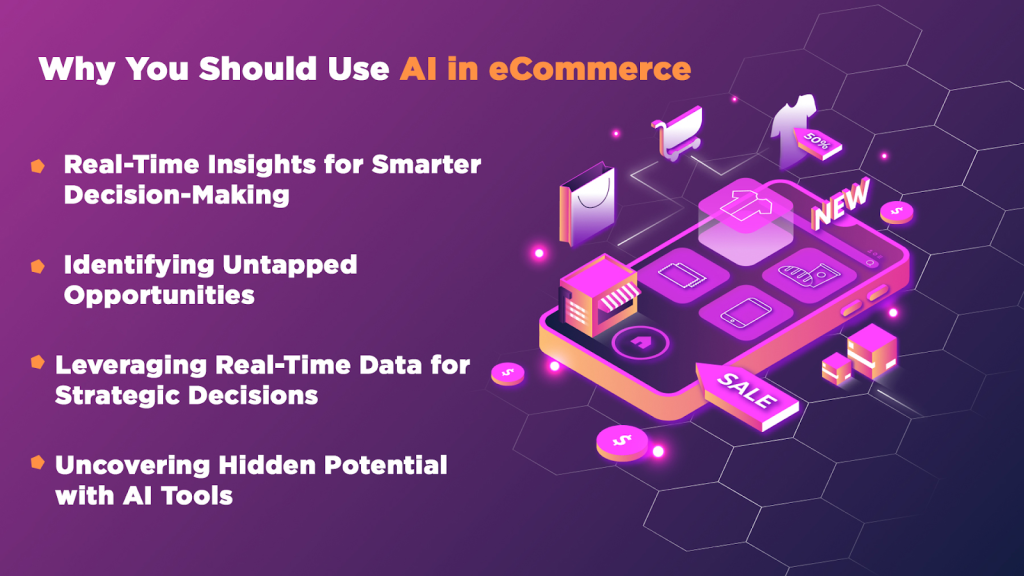
- Real-Time Insights for Smarter Decision-Making: ML and AI tools provide businesses with real-time analysis, which can be used to inform decisions about product offerings, pricing strategies, inventory management, and promotion campaigns.
- Identifying Untapped Opportunities: These digital marketing tools allow companies to identify opportunities that might have otherwise gone unnoticed or underutilized with previous forms of data analytics.
- Leveraging Real-Time Data for Strategic Decisions: AI and machine learning tools provide businesses with the ability to gather and analyze data in real-time.
- Uncovering Hidden Potential with AI Tools: AI-powered tools go beyond the obvious insights, identifying patterns and trends that human analysts might miss.
The Benefits of Using AI in Marketing
AI tools are rapidly changing the way businesses operate, and the eCommerce industry is no exception. With AI marketing tools, eCommerce businesses can improve customer engagement, streamline operations, and boost sales.
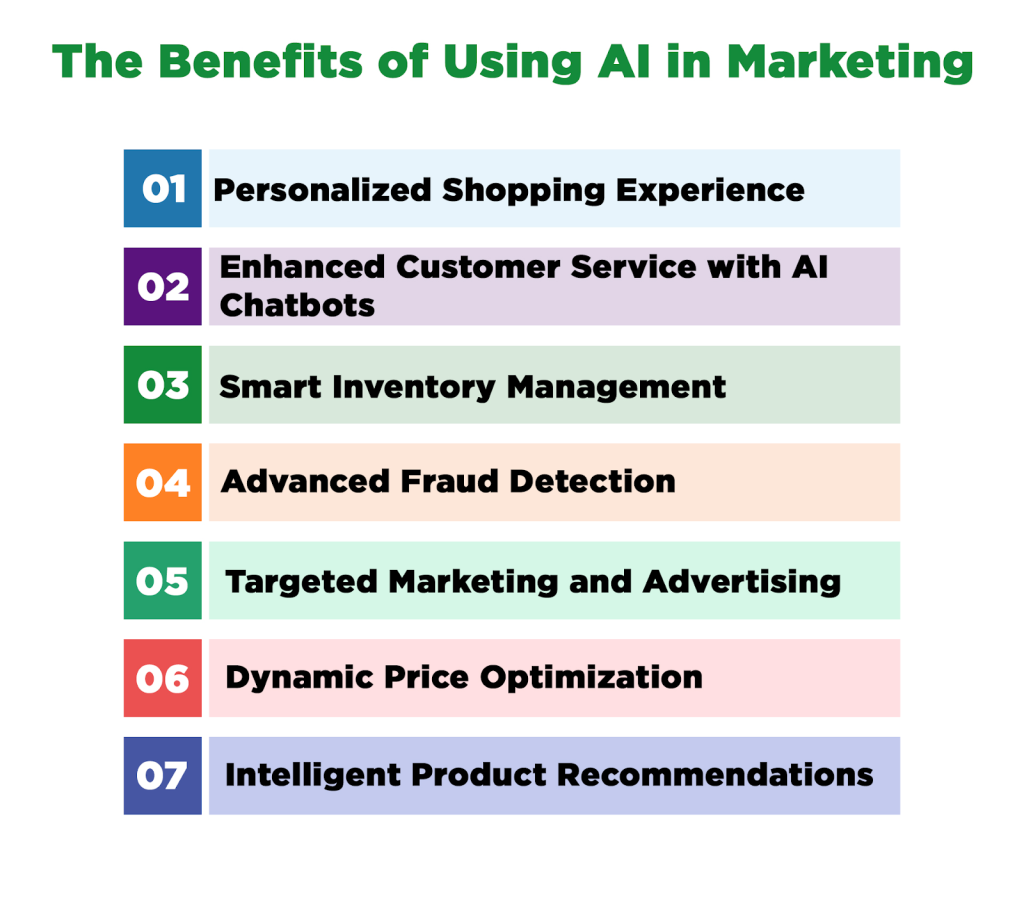
- Personalized shopping experience: AI marketing tools can examine data, browsing history, and purchase patterns to offer personalized recommendations and discounts, improving the overall customer experience.
- Customer service: AI-powered chatbots and virtual assistants can help customers find products, track orders, and provide instant support, reducing the need for human customer service agents.
- Inventory management: AI marketing tools can predict demand patterns, optimize inventory levels, and reduce wastage, improving efficiency and profitability.
- Fraud detection: AI algorithms can detect fraudulent activities such as fake orders, stolen credit cards, and chargebacks, reducing the risk of financial losses and improving security.
- Marketing and advertising: AI marketing eCommerce tools can analyze client data to create targeted advertising campaigns and optimize a company’s marketing strategy, improving customer acquisition and retention.
- Price optimization: AI algorithms can analyze market trends, competitor pricing, and customer behavior to set optimal prices, improving profitability and competitiveness.
- Product recommendations: AI algorithms can suggest complementary products based on customer preferences, improving cross-selling and upselling opportunities.
How Is AI Being Used in eCommerce?
AI marketing tools are being used in different ways throughout the eCommerce industry, from content marketing automation to customer journey optimization. Let’s take a look at some trends in the top AI marketing tools.

- Predictive Analytics: One of its primary applications of AI marketing tools is predictive analytics. This technology enables eCommerce companies to make decisions based on data collected from their customers’ past behavior, such as purchase history and browsing habits.
- SEO Optimization: AI marketing tools are also being used to improve search engine optimization (SEO). With AI-powered tools like natural language processing (NLP), companies can better target their SEO campaigns and ensure that their content appears higher in search results.
- AI Marketing Tools: By using AI-powered tools, companies can save time and money by automating certain tasks such as creating content for email newsletters or scheduling posts on social media networks.
- Real-Time Optimization: Real-time optimization involves using AI algorithms to make real-time adjustments to eCommerce marketing strategies based on customer actions and market trends.
- Personalized Recommendations: Personalized product recommendations involve using AI algorithms to analyze data and provide tailored product recommendations based on customer preferences and behavior.
- Customer Segmentation: Customer segmentation involves dividing customers into distinct groups based on shared characteristics such as demographics, behavior, and preferences.
- Intelligent Chatbots: Intelligent chatbots involve using AI-powered chatbots to provide instant customer support and improve customer engagement. Intelligent chatbots are becoming increasingly popular in eCommerce as businesses seek to reduce response times and improve customer satisfaction.
- Content Creation: Content creation involves using AI algorithms to create high-quality marketing data. AI-powered content creation is becoming increasingly popular in eCommerce as businesses seek to provide engaging and relevant content to customers.
- Pricing Optimization: Pricing optimization involves using AI algorithms to analyze market trends, competitor pricing, and customer actions to set optimal prices. Pricing optimization is becoming increasingly important in eCommerce as businesses seek to remain competitive and improve profitability.
- Remarketing Marketing Strategy: Remarketing involves using AI-powered advertising to target customers who have previously interacted with a business but have not made a purchase.
AI Tools to Use in eCommerce
The rapid advancement of technology has enabled Artificial Intelligence (AI) to be used in many different ways. Here are some of the top AI marketing tools to help with eCommerce marketing, customer interaction and retention, and website optimization.
Ortto

Ortto enables businesses to collect valuable consumer data with AI tools in order to better understand their target market and make informed decisions about product development and pricing strategies. With Ortto, businesses are able to improve their customer service, increase conversions, boost revenue, and gain a competitive edge in the eCommerce market.
HubSpot
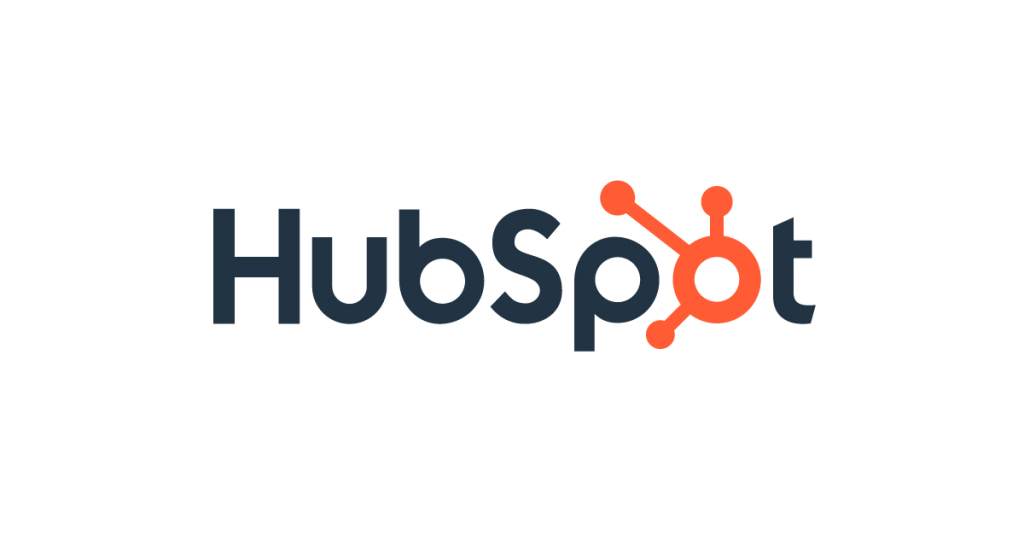
This AI-driven solution helps overcome writer’s block and reduces time spent on revisions, enabling businesses to focus on strategy and audience engagement. By automating the ad creation process, HubSpot’s tool ensures consistent quality and messaging, making it an efficient alternative to traditional methods.
Grammarly

Grammarly is an AI marketing tool that uses advanced algorithms to detect errors in written content, making it an invaluable aid for businesses and marketers alike. Grammarly is particularly effective at identifying common spelling and grammatical errors, as well as more complex issues such as tone, clarity, and word choice.
AI eCommerce and Marketing Tools
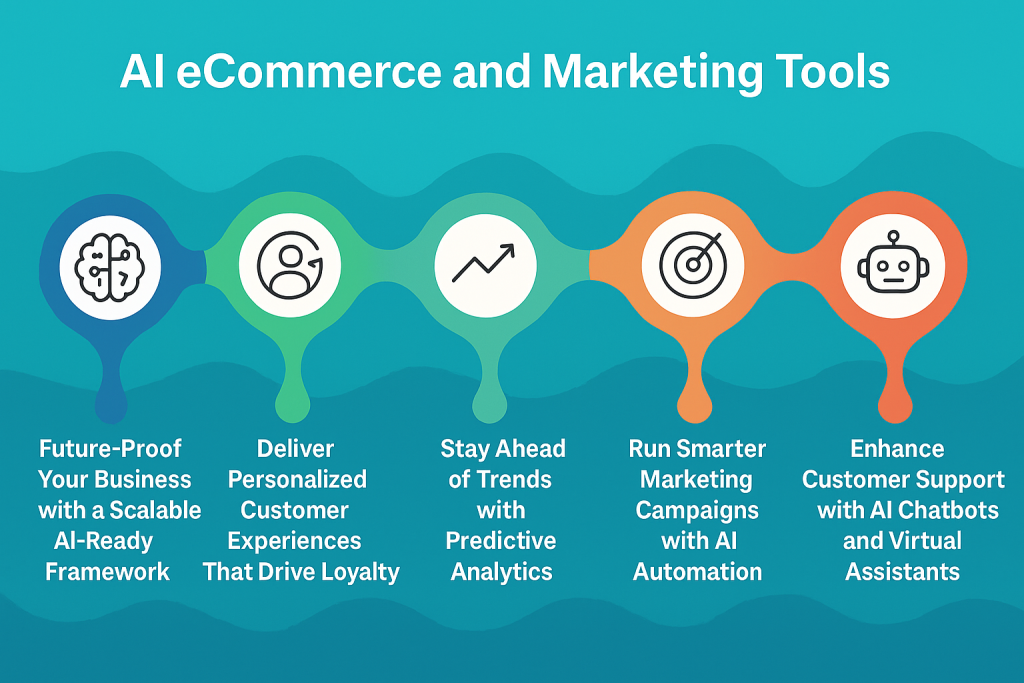
- Future-Proof Your Business with a Scalable AI-Ready Framework: If you’re planning to build or upgrade your eCommerce platform, Clarity offers a framework engineered from the ground up to support AI, both now and in the future.
- Personalized Customer Experiences That Drive Loyalty: AI tools can analyze browsing behavior, past purchases, and customer preferences to deliver tailored product recommendations, targeted promotions, and dynamic content.
- Predictive Analytics to Stay Ahead of Trends: AI doesn’t just help you understand what’s happening now—it helps you anticipate what’s next. With predictive analytics, businesses can forecast demand, spot emerging trends, and make proactive decisions.
- Smarter Marketing Campaigns with AI Automation: AI marketing tools take the guesswork out of your campaigns. From automated email sequences based on user behavior to optimizing ad placements in real-time AI helps marketers deliver the right message at the right time.
- Enhanced Customer Support with AI Chatbots and Virtual Assistants: AI-powered chatbots and virtual assistants are revolutionizing customer service. These tools provide 24/7 support, instantly answering FAQs, helping with order tracking, and even resolving simple issues—all without human intervention.
Conclusion
AI-powered tools are not just enhancing e-commerce strategies—they are transforming them from the ground up. By enabling smarter customer insights, personalized shopping experiences, efficient inventory management, and predictive analytics, AI is giving businesses a competitive edge in an increasingly crowded digital marketplace.
As technology continues to evolve, the e-commerce companies that embrace and integrate these intelligent solutions will be best positioned to innovate, scale, and meet the ever-changing expectations of modern consumers. The future of e-commerce is not only digital—it’s intelligent.
Deepak Wadhwani has over 20 years experience in software/wireless technologies. He has worked with Fortune 500 companies including Intuit, ESRI, Qualcomm, Sprint, Verizon, Vodafone, Nortel, Microsoft and Oracle in over 60 countries. Deepak has worked on Internet marketing projects in San Diego, Los Angeles, Orange Country, Denver, Nashville, Kansas City, New York, San Francisco and Huntsville. Deepak has been a founder of technology Startups for one of the first Cityguides, yellow pages online and web based enterprise solutions. He is an internet marketing and technology expert & co-founder for a San Diego Internet marketing company.

